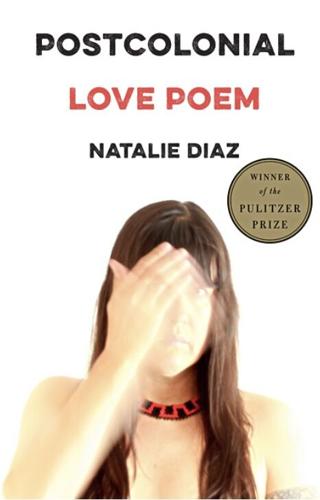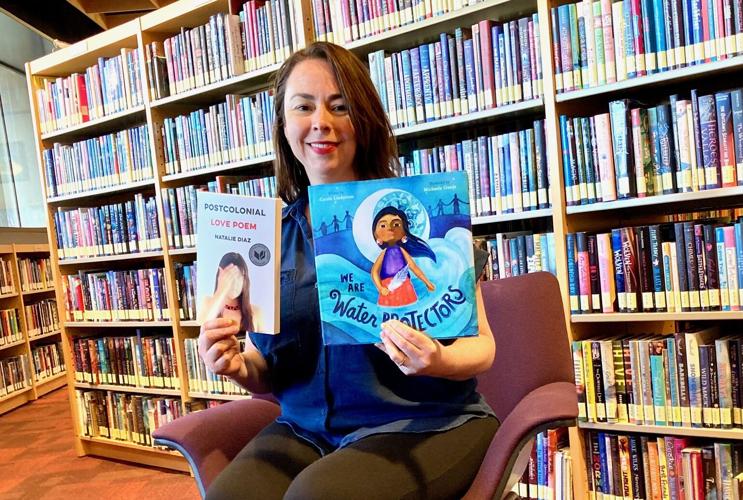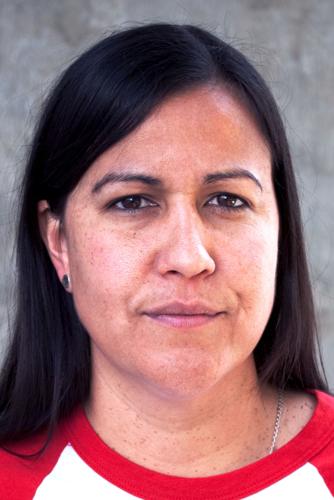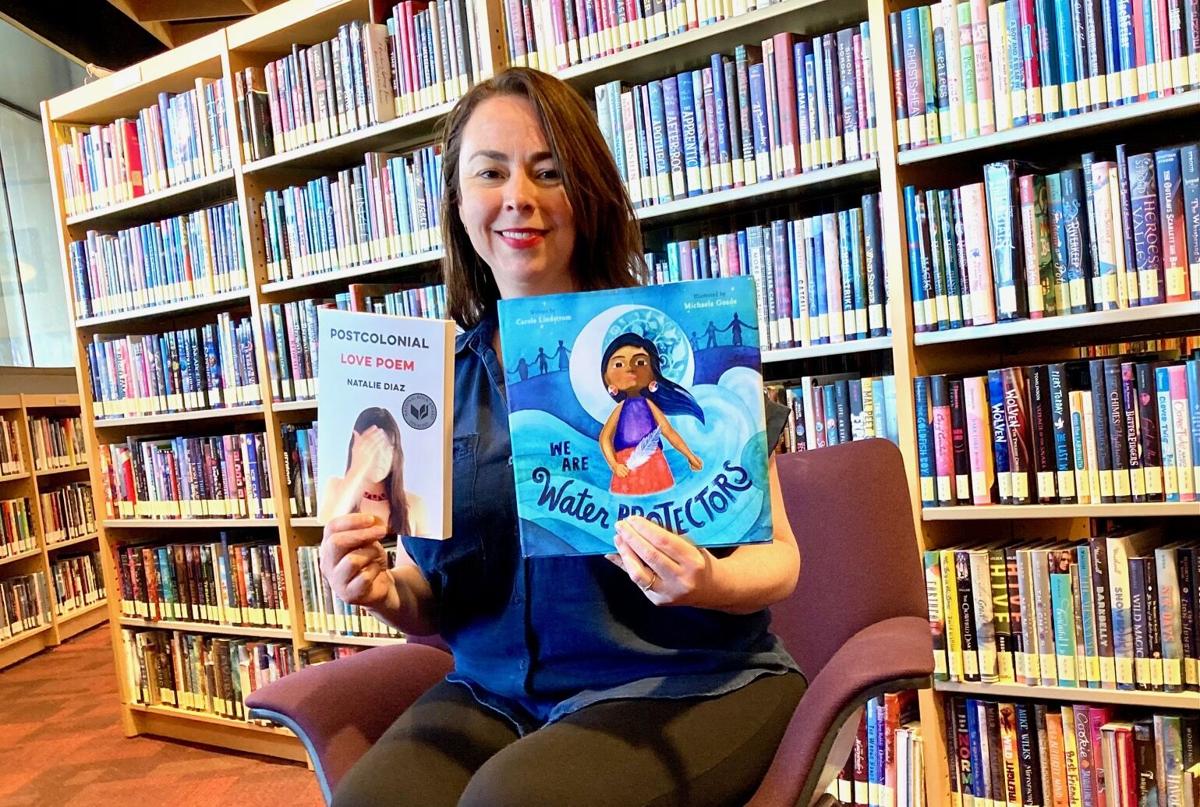To suggest that Arizona poet Natalie Diaz offers a unique perspective puts a lot of pressure on those poor six letters in the word “unique.”
Diaz was born near the banks of the Colorado River and raised on the Fort Mojave Indian Reservation in western Arizona. She was a high school basketball superstar who later led Old Dominion University to the Final Four as a freshman point guard. She played professional basketball in Europe. She is a Pulitzer Prize-winning poet. She identifies as Mojave, Latina and queer.
We see all these things in her award-winning collection, “Postcolonial Love Poem.”
Most of all, though, we see Arizona, which is why “Love Poem” will be the featured text when “Big Read Tucson” begins next weekend.

“Postcolonial Love Poem” will be the featured text for “Big Read Tucson” this year.
Organizers are encouraging us to read the book and take part in an upcoming gathering to discuss Diaz’s poems and the topics they explore.
The series will open with the kickoff event Saturday, Jan. 14, from 9 a.m. to noon at Mission Garden, 946 W. Mission Lane.
The program will be free and open to the public, with a variety of activities celebrating the power of storytelling and poetry when sharing cultural histories.
Sponsored by the National Endowment for the Arts, Big Read Tucson is a community all-read being presented by the University of Arizona.
Collaborators include the College of Social and Behavioral Sciences and the College of Education at UA, the Pima County Public Library, Literacy Connects, Make Way for Books, and other literary groups throughout Tucson.
The core group of planners at UA includes faculty members Sandra Soto, Carol Brochin, Leah Durán and Kathy Short.
Big Read gatherings have been scheduled in libraries, schools and other local gathering spots through April.
Diaz herself will take part in the Tucson Festival of Books on March 5. She will be on the Arizona Daily Star stage at 1 p.m. She will also do a reading on the Western National Parks Stage at 4 p.m. In addition, the Tucson Tome Gnome will be hiding copies of “Postcolonial Love Poem” that day around the UA campus.
Short, Director of the Worlds of Words Center at UA, was pleased to see “Love Poem” on the list of eligible books from the National Endowment for the Arts.
“If this is to be a community all-read, we wanted to choose something that could connect all of us … including our children,” she said. “Poetry is one genre that can be intergenerational; kids can come with their grandparents.”
Brochin likes the fact Diaz is an Arizonan who writes about issues that resonate now more than ever.
“Natalie represents a lot of what our state is today,” Brochin said. “She talks about things we should be talking about, too: sustainability, indigeneity, community. What can we do about these things in our own community?”
Clearly, Diaz’ perspective is unique. Not only was she raised on the Fort Mojave Reservation, she has returned to the Mojave Valley to live.
“Postcolonial Love Poem” covers a lot of ground, from the bitter history of Native displacement to the many challenges facing her people today. Diaz footnotes history, science, nature, dependency, mental health and Native American mysticism. Three of her poems are about basketball.
The one theme that flows throughout the collection, though, is water. In “The First Water is the Body,” Diaz describes the Mojave belief that the waters of the Colorado River flow through members of the tribe from the day they are conceived until the day they die.
In “How the Milky Way Was Made,” she imagines herself lifting fish and animals out of the river and placing them in the sky to relieve the suffering caused by polluted water.
The collection closes with “Grief Work.” In it, Diaz and her partner submerge themselves in the river. When they emerge, they feel “clean, and good.”
“Water and the future availability of water are probably the most important issues we have in our state today,” Brochin said.
For children who might not be ready to tackle the adult themes addressed in Love Poems, planners of Big Read Tucson have selected a companion text: “We Are Water Protectors,” a Caldecott Award-winning picture book by author Carole Lindstrom and illustrator Michaela Goade.
It, too, offers an Indigenous perspective on water. In Ojibwe culture, women are the protectors of water and men the protectors of fire. The Earth is threatened by the Black Snake, which many now interpret as the oil pipelines across native lands.
On the book’s final page, readers are invited to sign an “Earth and Water Protector” pledge.
Big Read Tucson will be our third NEA all-read in the last 11 years. In 2015-16, Literacy Connects sponsored a Big Read honoring Edgar Allan Poe. In 2011-12, Kore Press presented “Love Letters to Emily Dickinson.”
Footnotes
The National Endowment for the Arts awards dozens of Big Read grants each year to organizations interested in offering all-reads to their communities. This year’s awards were for $20,000 to purchase books and stage Big Read programs.
Big Read Tucson is one of 62 all-read programs being held this year across the United States. Two are being offered in Arizona. The Graham County Library in Safford is featuring “The Bear” by Andrew Krivac.
Author Tom Miller was remembered as a man who opened doors wherever he went at a memorial service Monday morning at Hudgel’s Funeral Home. Miller, whose books introduced us to the people of Cuba, Latin America and the American Southwest, died Dec. 19 at the age of 75. Smiling friends used the word “curmudgeon” a couple of times. “Cantankerous” was heard. But Miller’s occasional gruffness could not hide a big heart and total acceptance of everyone he ever met. “There were no unimportant people in his world,” one said. “He respected everyone, and wanted his stories to do them justice.”
Americans love to read banned books! Buzz60’s Keri Lumm shares the results of a new study conducted by OnePoll on behalf of Half Price Books.








